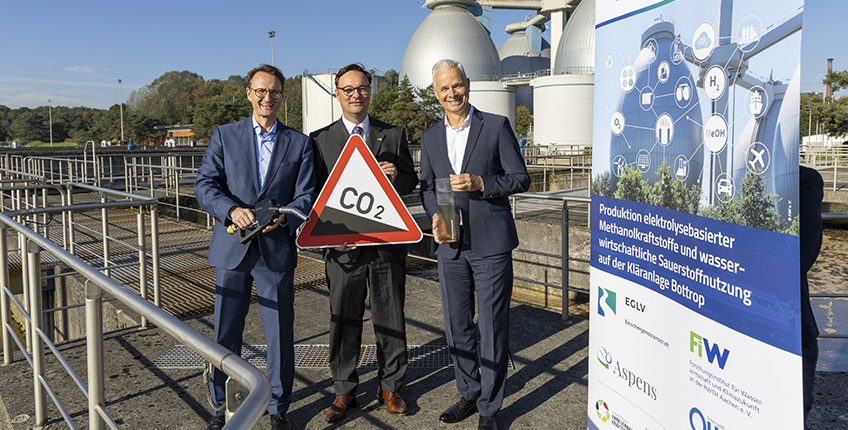Pilot project tests the production of electricity-based e-fuels for the first time in Bottrop. The Federal Ministry of Transport is funding the project with around twelve million euros.
Wastewater treatment plants do not only consume a great amount of energy – they now also produce a great deals of regenerative energy. The Emschergenossenschaft’s Bottrop wastewater treatment plant is already Germany’s first completely energy-autonomous large-scale treatment plant and is now also the scene of a very special pilot project: In the “E-BO(2)t” project, the production of electricity-based e-fuels is to be implemented for the first time on a scale that has so far never been seen before. The Federal Ministry for Digital and Transport (BMDV – Bundesministerium für Digitales und Verkehr) is providing 12.45 million euros in funding support for the project, in which the water, energy and transport sectors will be optimally coupled.
“In order to achieve the set climate targets in transport, we need to learn more about how the coupling of the water, energy and transport sectors can be gainfully used for the production of renewable e-fuels. This is precisely what the E-BO(2)t pilot project here in Bottrop aims to do, and I am therefore particularly pleased that the BMDV is supporting this forward-looking project with over 12 million euros,” says Oliver Luksic, Parliamentary State Secretary at the Federal Ministry for Digital and Transport.
For the production of green methanol-based fuels from carbon dioxide and hydrogen, wastewater treatment plants are characterised by several locational advantages: Wastewater treatment plants offer an excellent infrastructure for the construction of electrolysers. Iin addition to hydrogen production, they can make use of the co-produced pure oxygen in wastewater treatment to maintain clean waters. Another unique feature is a highly concentrated and thus easy-to-separate green carbon dioxide source. Sewage gas contains 30 to 50 percent green CO2 – which is extracted at the Bottrop wastewater treatment plant in the course of the treatment of wastewater and the resulting sewage sludge utilisation in the four digesters of the Emschergenossenschaft that are visible from afar. In addition, wastewater treatment plants have a dynamic electricity and heat balance that can be used for the energy needs of the e-methanol facility.
“The advantage for us as wastewater treatment plant operators lies, among other things, in the green use of the carbon dioxide produced during the generation of sewage gas, as well as in the production of storable methanol as a fuel for commercial vehicles that could not previously be electrified, and for backup power generators in the event of emergencies, such as for the operation of our pumping stations during a power outage, as well as an agent in the elimination of nitrogen. Moreover, being an important raw material worldwide, green methanol can reduce the chemical industry’s dependence on fossil raw materials,” says Dr. Frank Obenaus, Technical Director of the Emschergenossenschaft.
As part of the “E-BO(2)t” pilot project, these synergy potentials are being investigated for the first time and operating experience is being gathered by means of an innovative “power-to-methanol” demonstration plant at the Bottrop wastewater treatment plant. The core of the project is the construction of the demonstration facility, which consists of the subcomponents carbon dioxide separation, electrolyser and methanol synthesis. “The system consisting of a wastewater treatment plant and an e-methanol plant will be scientifically monitored and tested for scalability and replication. If successful, the project at the Emschergenossenschaft wastewater treatment plant can set an example and serve as a blueprint for numerous other wastewater treatment plants,” says Dr. Frank-Andreas Weber, Managing Director of the Research Institute for Water Management and Climate Future at RWTH Aachen e.V. (FiW – Forschungsinstitut für Wasserwirtschaft und Klimazukunft).
The Emschergenossenschaft, the FiW and OWI Science for Fuels gGmbH research institutes as well as the electrolyser manufacturer Aspens GmbH are working together in partnership in a project consortium for the ambitious coupling of the water-energy-transport sectors in order to bring research results into large-scale application.
The “E-BO(2)t” project is being supported by the Federal Ministry for Digital and Transport with a total of 12.45 million euros in funding as part of the overall Renewable Fuels Concept. The funding guideline for the development of renewable fuels is coordinated by NOW GmbH and implemented by the project management organisations VDI/VDE Innovation + Technik GmbH and the Fachagentur Nachwachsende Rohstoffe e. V. (Agency for Renewable Resources).
Photo: Markus Matzel/EGLV


